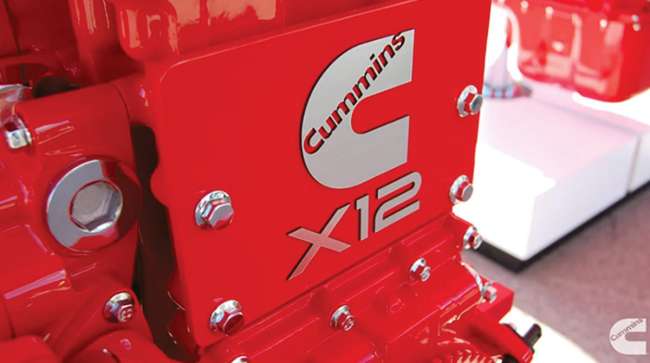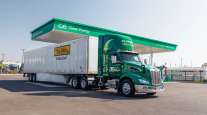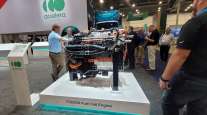Senior Reporter
Cummins Is Top Overall Supplier of Class 8 Engines in First Half of 2020

[Stay on top of transportation news: Get TTNews in your inbox.]
Independent engine maker Cummins Inc. supplied a leading 34.7% of the diesel engines used in the first half of 2020, much of which was beset by disruptions to truck production amid the novel coronavirus pandemic, WardsAuto.com reported.
The report breaks Class 8 engines into two segments, 10 liters and greater as well as under 10 liters.
Cummins’ dominance with its smaller L9 engine ensured it posted the overall lead.

Detroit Diesel Corp. led Cummins in the number of engines 10L and over by nearly 8 percentage points. Freightliner, the leader in U.S. Class 8 retail sales, is the largest user of DD engines and both are units of Daimler Trucks North America. There were 73,386 engines produced in the 10L and over category: DD made 26,002, or 35.4%. Cummins made 27.8%, or 20,431 engines.
“We are pretty proud because looking backward, 10 years ago, we didn’t have any proprietary engines at all. And these days we came up to a very high percentage of Detroit Diesel engines in our vehicles. This is really the dominant portion of the vehicles we sell,” said Rainer Müller-Finkeldei, senior vice president of engineering and technology at DTNA. “We improved the fuel efficiency of the Cascadia over 2007 [its introduction] by 35% and are delivering every year more fuel efficiency benefits.”
In the meantime, Cummins began shipments of its X12 engine to Freightliner for use in their Cascadia day cab and sleeper models in the second quarter.

Linebarger
“Our entry into the regional haul market with the low weight X12 will further support our leading share in this market,” Cummins Chairman and CEO Tom Linebarger said in an earnings call July 28.
Cummins was not available for further comments.
The total number of engines in the lighter Class 8 segment was 9,586. Cummins had an 87.5% share, or 8,389 engines. Freightliner accounted for 53% of the Cummins engines, or 4,447.
“I can understand there are some customers that still prefer, for example, Cummins engines which are also very solid engines. We think our proprietary powertrains still have a significant fuel efficiency benefit compared with other engines,” said Müller-Finkeldei.
He said some customers also may have mixed fleets and have Cummins engines in Freightliner models and competing truck brands. “We want to give all our customers the freedom to choose.”
Speaking of Cummins’ large presence in Class 8 engines under 10L, Mike Roeth, executive director of the North American Council for Freight Efficiency, said, “The vast majority, maybe all, of the under 10L engines are in things like dump trucks, snowplows and refuse trucks, not over-the-road tractors. Cummins does dominate there and so it’s not surprising to me.”
International had a 37% share of Cummins under 10L engines, taking 3,107. Other brands in the mix: DTNA’s Western Star had 461, Mack took 259 and Peterbilt had 115.
Mack Trucks is a brand of Volvo Group. Peterbilt Motors Co. is a brand of Paccar Inc.
The figures come from a Wards report on North American factory sales of heavy-duty trucks, including their engines, released July 31. Factory sales are the transactions between the factory and the dealers.
The Wards data includes only trucks built in the United States and Canada, along with Mexico exports to the United States and Canada.
Cummins noted last year its Class 8 engine sales sold domestically in Mexico and those exported to South American countries from Mexico are omitted in the report and so it understates its overall North American business.

Connectivity is changing trucking today and into the future, including how it could enable electric and self-driving trucks. Host Seth Clevenger talks with two experts from Penske Transportation Solutions, Bill Combs and Samantha Thompson. Hear a snippet, above, and get the full program by going to RoadSigns.TTNews.com.
Also, the report, without providing further details, noted the Freightliner data is incomplete for North America.
Meanwhile, Wards found the total number of Class 8 diesel engines installed in the first half of 2020 reached 82,972 — plunging from 171,292 a year earlier. All truck makers this year curtailed production at times amid the spread of the novel coronavirus pandemic.
Cummins provided 28,820, or 34.7% of the overall Class 8 total. Detroit Diesel provided 26,770, or 32.2%.
Volvo Group’s Volvo Trucks North America and Mack Trucks brands, collectively, were third with a 16.9% share, or 14,101 engines, evenly split between the two brands.
Paccar Inc., which makes the MX engine, was next with 10,328, or a 12.4% share for its Peterbilt and Kenworth Truck Co. brands.
International accounted for 2,857 engines and a 3.4% share. International is a brand of Navistar Inc. It makes the 12.4L A26 engine.

Müller-Finkeldei
Looking forward, Müller-Finkeldei said more choices are coming.
“If we now look into what’s happening, despite all the variants we have in diesel-driven powertrains, we additionally will get electric-drive vehicles with batteries and later also fuel cells,” he said. “It will be a question of will we need to have every specific powertrain configuration for every specific segment. Or can we focus on several, but also offer third-party powertrain solutions in our [truck] product. The variance in the powertrains will grow even more in the next years to come.”
Paccar CEO Preston Feight said in an earnings call when these alternative fuel trucks arrive in commercial numbers, flexible manufacturing capability will be key “so that you can combine, not just zero emissions, but clean diesel technologies and run them down the same line, so you can maintain efficiencies and be profitable in that way.”
Want more news? Listen to today's daily briefing:
Subscribe: Apple Podcasts | Spotify | Amazon Alexa | Google Assistant | More




